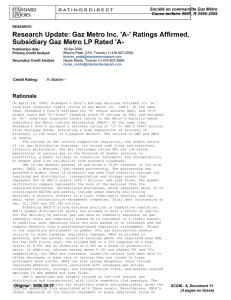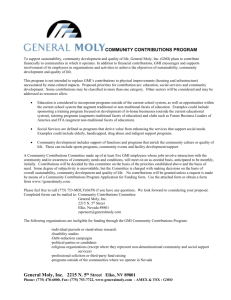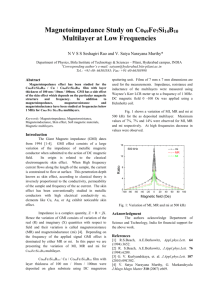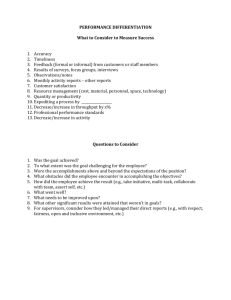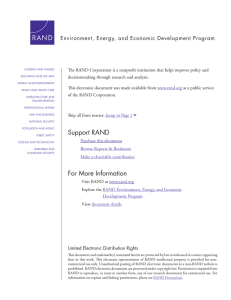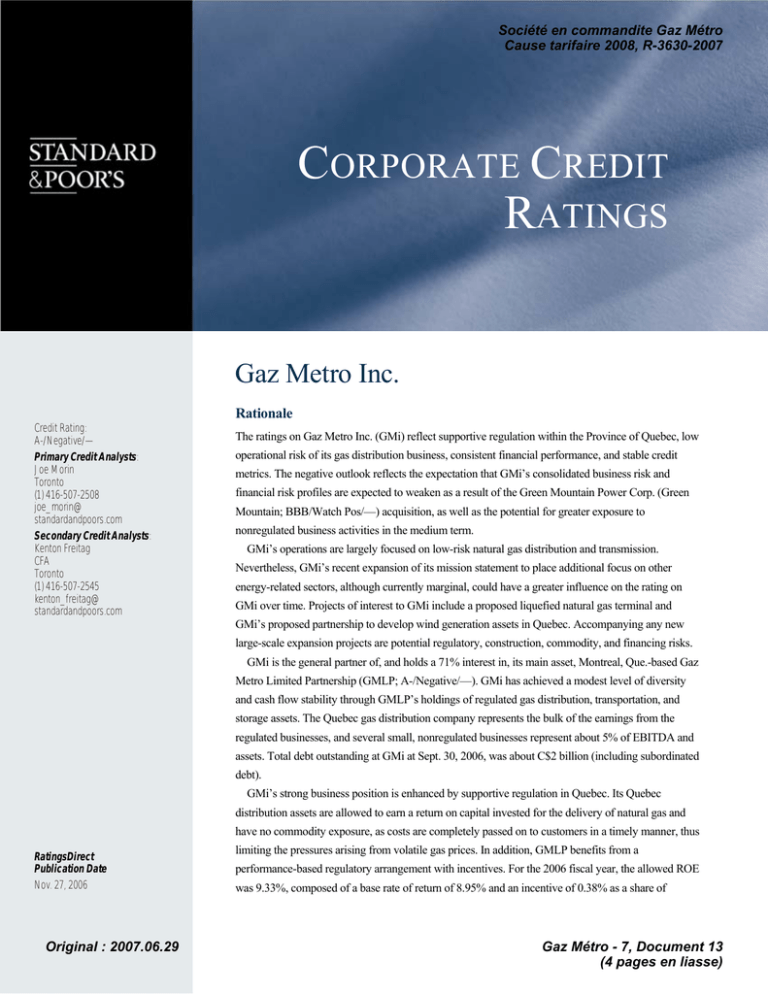
Société en commandite Gaz Métro
Cause tarifaire 2008, R-3630-2007
CORPORATE CREDIT
RATINGS
Gaz Metro Inc.
Rationale
Credit Rating:
A-/Negative/—
Primary Credit Analysts:
Joe Morin
Toronto
(1) 416-507-2508
joe_morin@
standardandpoors.com
Secondary Credit Analysts:
Kenton Freitag
CFA
Toronto
(1) 416-507-2545
kenton_freitag@
standardandpoors.com
The ratings on Gaz Metro Inc. (GMi) reflect supportive regulation within the Province of Quebec, low
operational risk of its gas distribution business, consistent financial performance, and stable credit
metrics. The negative outlook reflects the expectation that GMi’s consolidated business risk and
financial risk profiles are expected to weaken as a result of the Green Mountain Power Corp. (Green
Mountain; BBB/Watch Pos/—) acquisition, as well as the potential for greater exposure to
nonregulated business activities in the medium term.
GMi’s operations are largely focused on low-risk natural gas distribution and transmission.
Nevertheless, GMi’s recent expansion of its mission statement to place additional focus on other
energy-related sectors, although currently marginal, could have a greater influence on the rating on
GMi over time. Projects of interest to GMi include a proposed liquefied natural gas terminal and
GMi’s proposed partnership to develop wind generation assets in Quebec. Accompanying any new
large-scale expansion projects are potential regulatory, construction, commodity, and financing risks.
GMi is the general partner of, and holds a 71% interest in, its main asset, Montreal, Que.-based Gaz
Metro Limited Partnership (GMLP; A-/Negative/—). GMi has achieved a modest level of diversity
and cash flow stability through GMLP’s holdings of regulated gas distribution, transportation, and
storage assets. The Quebec gas distribution company represents the bulk of the earnings from the
regulated businesses, and several small, nonregulated businesses represent about 5% of EBITDA and
assets. Total debt outstanding at GMi at Sept. 30, 2006, was about C$2 billion (including subordinated
debt).
GMi’s strong business position is enhanced by supportive regulation in Quebec. Its Quebec
distribution assets are allowed to earn a return on capital invested for the delivery of natural gas and
have no commodity exposure, as costs are completely passed on to customers in a timely manner, thus
RatingsDirect
Publication Date
Nov. 27, 2006
Original : 2007.06.29
limiting the pressures arising from volatile gas prices. In addition, GMLP benefits from a
performance-based regulatory arrangement with incentives. For the 2006 fiscal year, the allowed ROE
was 9.33%, composed of a base rate of return of 8.95% and an incentive of 0.38% as a share of
Gaz Métro - 7, Document 13
(4 pages en liasse)
Gaz Metro Inc.
productivity gains. In addition, returns earned greater than 9.33% (overearnings) are shared 25% and 75%,
respectively, between GMLP and its customers; realized ROE for 2006 was 9.66%. For 2007 total ROE has
been authorized at 9.57% and, therefore, Standard & Poor’s Ratings Services expects net income for 2007 to
remain relatively unchanged.
The utility has a monopoly-like position for natural gas distribution in Quebec (distributing 97% of natural
gas consumed); however, competition arises from alternative forms of energy. Market penetration of natural gas
in the Quebec energy market is low, about one-half of the national average, as a result of highly competitive
electricity rates. Therefore, GMi has a low residential penetration rate in the energy market. GMi’s relatively
high exposure to industrial customers with fuel-switching capability exposes its cash flows to the pricing
differentials between natural gas and fuel oil prices. Furthermore, the large proportion of revenues to industrial
customers also exposes GMi to economic slowdowns.
GMLP’s transportation operations, which represent about 15% of its income, are supported by either a
profitable tolling agreement with shippers (Portland Natural Gas Transmission System (PNGTS)) or cost-ofservice plus rate-of-return regulation (Trans Quebec & Maritimes Pipeline Inc.; BBB+/Stable/—).
Nevertheless, we would expect a moderate degree of revenue and cash flow variability with respect to these two
entities. Recently, cash flows were negatively affected at PNGTS due to the bankruptcy of a large customer.
GMi’s average financial risk profile largely reflects the highly leveraged balance sheet of about 60%
compared with that of global peers and low authorized rates of return. Rates are set using regulated assumptions
and a deemed capital structure. Should the acquisition of Green Mountain be approved, GMLP is expected to
have projected adjusted funds from operations (AFFO) interest coverage of about 3x and FFO-to-average total
debt of about 20%, on an unadjusted basis. Although cash flow generation is expected to be more than
sufficient to meet all capital expenditures within the forecast period, GMLP’s policy of distributing between
95%-100% of its earnings to unitholders places some constraint on the company’s financial flexibility.
Although distributions could be reduced or suspended at any time, there is a significant market disincentive to
do so.
Liquidity
Standard & Poor’s assesses GMi’s liquidity to be adequate supported by stable cash flows at GMLP. GMLP
generated C$155.5 million in free operating cash flow (after capital expenditures) for fiscal year 2006, ended
Sept. 30, 2006. GMLP has funded substantial investments in its distribution network, having invested C$653
million in the past five years, including C$154 million in fiscal 2006. Capital spending for 2007 is expected to
be in line with the average of what was spent in the past five years. Given the structure of its main subsidiary
GMLP as a flow-through entity, pay-out is very high at about 95%-100% of net income; total distributions by
GMLP for 2006 were C$156 million, but should be only about C$149 million in 2007.
GMi also maintains good access to external sources of financing through its various credit facilities. At Sept.
30, 2006, the company had almost full availability under its C$400 million CP program, which is backed by a
C$400 million term loan that matures in December 2010. GMi and its subsidiaries also have about C$145.7
million in revolving short-term lines of credit, of which about C$108.6 million was available at Sept. 30, 2006.
GMi’s debt maturity schedule is not onerous, with about C$81 million due in 2007 (on a fiscal-year basis). The
company is currently in compliance with all of the financial tests and covenants contained in its credit facilities.
The CP program is adequate when factoring in normal seasonal fluctuations that are consistent with building
gas inventories in the summer and fall to meet winter demand requirements.
Standard & Poor’s | ANALYSIS
2
Gaz Metro Inc.
Recovery analysis
The rating on GMi’s first mortgage bonds is ‘A’, with a recovery rating of ‘1’, indicating a high expectation of
full recovery of principal (100%) in the event of a payment default. The secured debt at GMi is rated one notch
higher than the corporate credit rating due to the amount of collateral securing the debt. Its first mortgage bonds
are secured under a trust deed that contains a hypothec on effectively all movable property of GMi, present and
future, situated in Quebec. The creditors are also covered by a first immovable hypothec on GMLP’s present
and future pipelines and gas distribution system. The first mortgage bonds comprise 10 individual debt issues
with maturities ranging from 2007 to 2036 (on a fiscal-year basis).
Standard & Poor’s believes that if GMi were to default, it would continue to operate as part of a reorganized
entity because of the essential service nature of its business. The single most important factor in determining a
utility’s asset value upon emergence from bankruptcy is the revenue stream that regulators allow it to collect. In
GMi’s case, there is a high correlation between the value of the regulated rate base and the book value of the
assets. Therefore, absent extenuating circumstances, Standard & Poor’s will assume that the book value of
assets represents fair value. The recovery estimate compares the level of collateral to the potential amount of
secured debt.
Outlook
The negative outlook reflects the expectation that GMi’s consolidated business risk and financial risk profiles
are expected to weaken as a result of the Green Mountain acquisition. A negative rating action is possible if
GMi’s business risk profile further deteriorates through a material expansion of higher risk businesses, or a
further weakening of its financial risk profile. Conversely, an outlook revision to stable would require debt
reduction, which is unexpected to offset increased in exposure to businesses with less supportive regulatory
backing.
www.standardandpoors.com
3
Gaz Metro Inc.
Published by Standard & Poor's, a Division of The McGraw-Hill Companies, Inc. Executive offices: 1221 Avenue of the Americas, New York, NY 10020.
Editorial offices: 55 Water Street, New York, NY 10041. Subscriber services: (1) 212-438-7280. Copyright 2006 by The McGraw-Hill Companies, Inc.
Reproduction in whole or in part prohibited except by permission. All rights reserved. Information has been obtained by Standard & Poor's from sources
believed to be reliable. However, because of the possibility of human or mechanical error by our sources, Standard & Poor's or others, Standard & Poor's
does not guarantee the accuracy, adequacy, or completeness of any information and is not responsible for any errors or omissions or the result obtained
from the use of such information. Ratings are statements of opinion, not statements of fact or recommendations to buy, hold, or sell any securities.
Standard & Poor's uses billing and contact data collected from subscribers for billing and order fulfillment purposes, and occasionally to inform subscribers
about products or services from Standard & Poor's, our parent, The McGraw-Hill Companies, and reputable third parties that may be of interest to them. All
subscriber billing and contact data collected is stored in a secure database in the U.S. and access is limited to authorized persons. If you would prefer not to
have your information used as outlined in this notice, if you wish to review your information for accuracy, or for more information on our privacy practices,
please call us at (1) 212-438-7280 or write us at: privacy@standardandpoors.com. For more information about The McGraw-Hill Companies Privacy Policy
please visit www.mcgraw-hill.com/privacy.html.
Analytic services provided by Standard & Poor's Ratings Services ("Ratings Services") are the result of separate activities designed to
preserve the independence and objectivity of ratings opinions. Credit ratings issued by Ratings Services are solely statements of opinion
and not statements of fact or recommendations to purchase, hold, or sell any securities or make any other investment decisions.
Accordingly, any user of credit ratings issued by Ratings Services should not rely on any such ratings or other opinion issued by Ratings
Services in making any investment decision. Ratings are based on information received by Ratings Services. Other divisions of Standard
& Poor's may have information that is not available to Ratings Services. Standard & Poor's has established policies and procedures to
maintain the confidentiality of non-public information received during the ratings process.
Ratings Services receives compensation for its ratings. Such compensation is normally paid either by the issuers of such securities or by
the underwriters participating in the distribution thereof. The fees generally vary from US$2,000 to over US$1,500,000. While Standard
& Poor's reserves the right to disseminate the rating, it receives no payment for doing so, except for subscriptions to its publications.
Permissions: To reprint, translate, or quote Standard & Poor's publications, contact: Client Services, 55 Water Street, New York, NY
10041; (1) 212-438-9823; or by e-mail to: research_request@standardandpoors.com.
Standard & Poor’s | ANALYSIS
4


